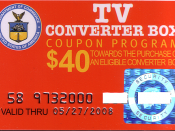Since signing into law of the Communications Act of 1934, the FCC has been the ironclad authority that defines obscene material. In 1934, this was not much of a problem. Music used no profanity and never talked directly about sex. As the content of music has changed over the years, however, the role of the FCC has changed. Music today features explicit lyrics that often describe sex, violence towards authority, and the consumption of illegal substances. As a result, the FCC today is a more powerful organization that extends its reaches into all aspects of media. Radio and television, however, remain the mediums in which the FCC exercises the most control over what it calls "obscene" and "indecent" materials. Though it may not always make decisions that everyone agrees with, the FCC is an organization that represents the desires, rights, and interests of the American people regarding public broadcasts in a manner most suitable to the majority.
The FCC effectively represents the people in three ways. First, the FCC only bans material in radio, which it finds to be obscene according to a very strict definition. Second, the FCC protects the first amendment rights of citizens by providing mediums in public radio in which material that it defines as "indecent" or "profane" may be heard. Third, all of the FCC's statutes regarding censorship are very flexible, so that as moral values change, so will the definitions of obscenity and indecency.
The FCC has a great responsibility in enforcing the law regarding obscene speech that was clarified by the Supreme Court in the case of Miller v. California (1973). In this case, a man conducted mass mailings of pornographic material to hundreds of people. The court found that this man was not exercising free speech because his mailings served no...


